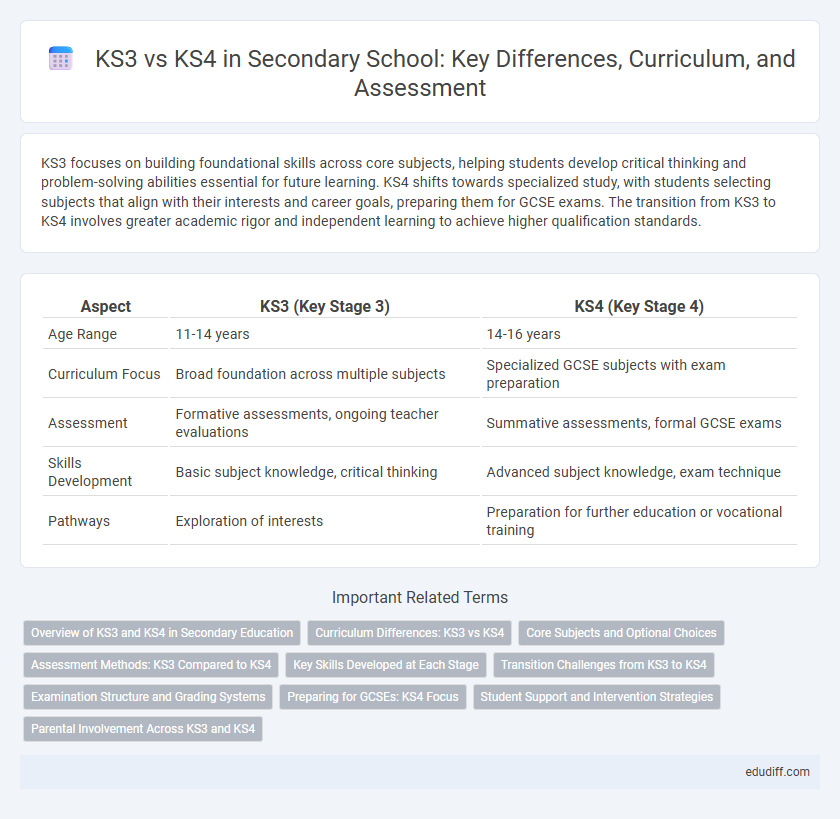KS3 focuses on building foundational skills across core subjects, helping students develop critical thinking and problem-solving abilities essential for future learning. KS4 shifts towards specialized study, with students selecting subjects that align with their interests and career goals, preparing them for GCSE exams. The transition from KS3 to KS4 involves greater academic rigor and independent learning to achieve higher qualification standards.
Table of Comparison
| Aspect | KS3 (Key Stage 3) | KS4 (Key Stage 4) |
|---|---|---|
| Age Range | 11-14 years | 14-16 years |
| Curriculum Focus | Broad foundation across multiple subjects | Specialized GCSE subjects with exam preparation |
| Assessment | Formative assessments, ongoing teacher evaluations | Summative assessments, formal GCSE exams |
| Skills Development | Basic subject knowledge, critical thinking | Advanced subject knowledge, exam technique |
| Pathways | Exploration of interests | Preparation for further education or vocational training |
Overview of KS3 and KS4 in Secondary Education
Key Stage 3 (KS3) in secondary education covers students aged 11 to 14, focusing on foundational subjects such as English, Maths, Science, and Humanities to build core knowledge and skills. Key Stage 4 (KS4) spans ages 14 to 16, emphasizing subject specialization and preparation for GCSE exams, which determine qualifications for further education or vocational pathways. Both stages align curriculum frameworks to ensure progression, skill development, and assessment readiness in the UK education system.
Curriculum Differences: KS3 vs KS4
KS3 curriculum emphasizes broad foundational knowledge across core subjects like English, Maths, Science, and Humanities, fostering transferable skills and exploratory learning. KS4 shifts focus to more specialized, exam-oriented content with compulsory subjects narrowing and optional pathways tailored towards GCSE qualifications. Assessment methods progress from formative approaches in KS3 to summative, standardized exams in KS4, driving deeper subject mastery and academic progression.
Core Subjects and Optional Choices
KS3 curriculum emphasizes foundational knowledge in core subjects such as English, Math, and Science, providing a broad base for secondary education. KS4 allows students to specialize by selecting optional subjects like History, Art, and Computer Science, tailoring their studies towards GCSE qualifications. This structure facilitates skill development while aligning with career interests and higher education goals.
Assessment Methods: KS3 Compared to KS4
KS3 assessment methods emphasize formative approaches, including ongoing teacher observations, quizzes, and project-based tasks to monitor student progress and identify learning gaps early. KS4 assessment shifts towards summative exams like GCSEs, standardized testing, and controlled assessments designed to measure cumulative knowledge and prepare students for qualifications. This progression ensures a balance between continuous evaluation and final performance measurement across Key Stages.
Key Skills Developed at Each Stage
KS3 emphasizes foundational skills such as literacy, numeracy, and critical thinking, laying the groundwork for complex problem-solving and independent learning. KS4 builds on these basics by enhancing subject-specific expertise, exam technique, and time management, preparing students for GCSE assessments. This progression ensures students develop a robust skill set essential for academic success and future career opportunities.
Transition Challenges from KS3 to KS4
Transition challenges from KS3 to KS4 include increased academic expectations, more complex subject content, and higher workload demands. Students often face pressure adapting to exam-focused assessments like GCSEs, requiring stronger time management and study skills. Emotional and social adjustments also impact performance as pupils navigate greater independence and subject specialization.
Examination Structure and Grading Systems
KS3 assessments emphasize continuous teacher evaluations and end-of-year exams that gauge foundational subject knowledge, whereas KS4 centers on formal public examinations such as GCSEs with a structured grading scale from 9 to 1. The KS3 framework supports diagnostic feedback to inform teaching strategies, contrasting with KS4's summative approach that directly influences further education and career pathways. Grading at KS4 incorporates a more granular differentiation of student performance, aligning with national standards to ensure consistency and comparability across schools.
Preparing for GCSEs: KS4 Focus
KS4 curriculum intensively prepares students for GCSEs by emphasizing subject-specific skills and examination techniques essential for success. Targeted revision strategies and practice assessments during KS4 build confidence and knowledge retention, aligning closely with the GCSE assessment criteria. Tailored support and monitored progress in KS4 ensure students meet the rigorous standards required for GCSE qualifications.
Student Support and Intervention Strategies
KS3 student support emphasizes early identification of learning gaps through formative assessments, enabling targeted interventions that build foundational skills and boost confidence. In contrast, KS4 support strategies prioritize tailored exam preparation, including revision sessions, personalized tutoring, and mental health resources to manage stress and optimize performance. Effective intervention at both stages integrates data-driven monitoring and collaborative approaches involving teachers, parents, and support staff to maximize student progress and engagement.
Parental Involvement Across KS3 and KS4
Parental involvement significantly influences student outcomes across both KS3 and KS4, with increased engagement correlating to improved academic performance and motivation. During KS3, parents often support foundational subject understanding and homework completion, while in KS4, their role shifts towards guidance on exam preparation and post-16 education choices. Effective communication between schools and parents enhances student progress monitoring and helps address challenges promptly throughout these key stages.
KS3 vs KS4 Infographic

 edudiff.com
edudiff.com